Comparing Two 1TB NVMe Drives with Same NAND, Same Controller: XPG SX8200 Pro vs HP EX950
by Billy Tallis on February 6, 2019 11:30 AM ESTMixed Random Performance
Our test of mixed random reads and writes covers mixes varying from pure reads to pure writes at 10% increments. Each mix is tested for up to 1 minute or 32GB of data transferred. The test is conducted with a queue depth of 4, and is limited to a 64GB span of the drive. In between each mix, the drive is given idle time of up to one minute so that the overall duty cycle is 50%.
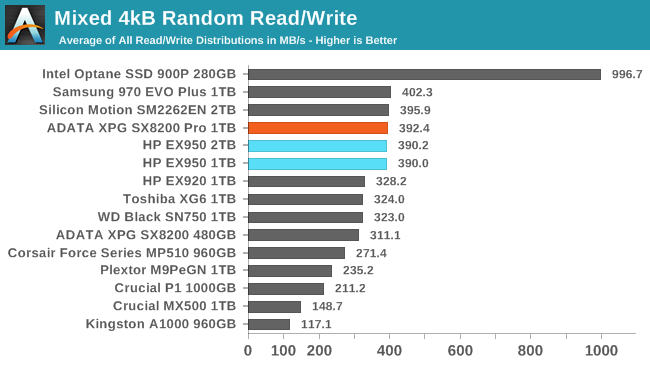
The ADATA SX8200 Pro and HP EX950 provide top-tier performance on our mixed random I/O test, just shy of the Samsung 970 EVO Plus. The 2TB EX950 has almost identical overall performance to the 1TB models.
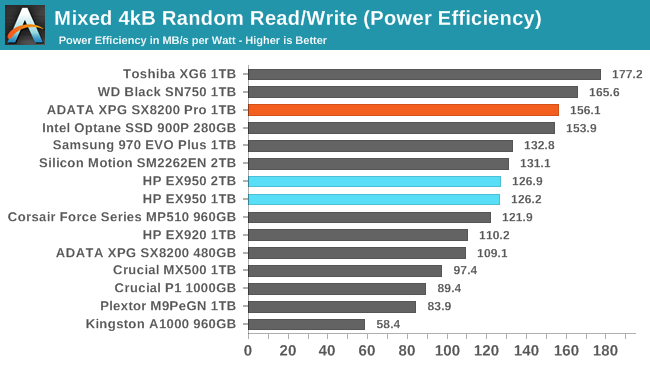 |
|||||||||
| Power Efficiency in MB/s/W | Average Power in W | ||||||||
The power efficiency of the ADATA SX8200 Pro isn't quite as good as the Toshiba XG6 or WD Black SN750, but it's well ahead of the rest of the flash-based SSDs, including the HP EX950.
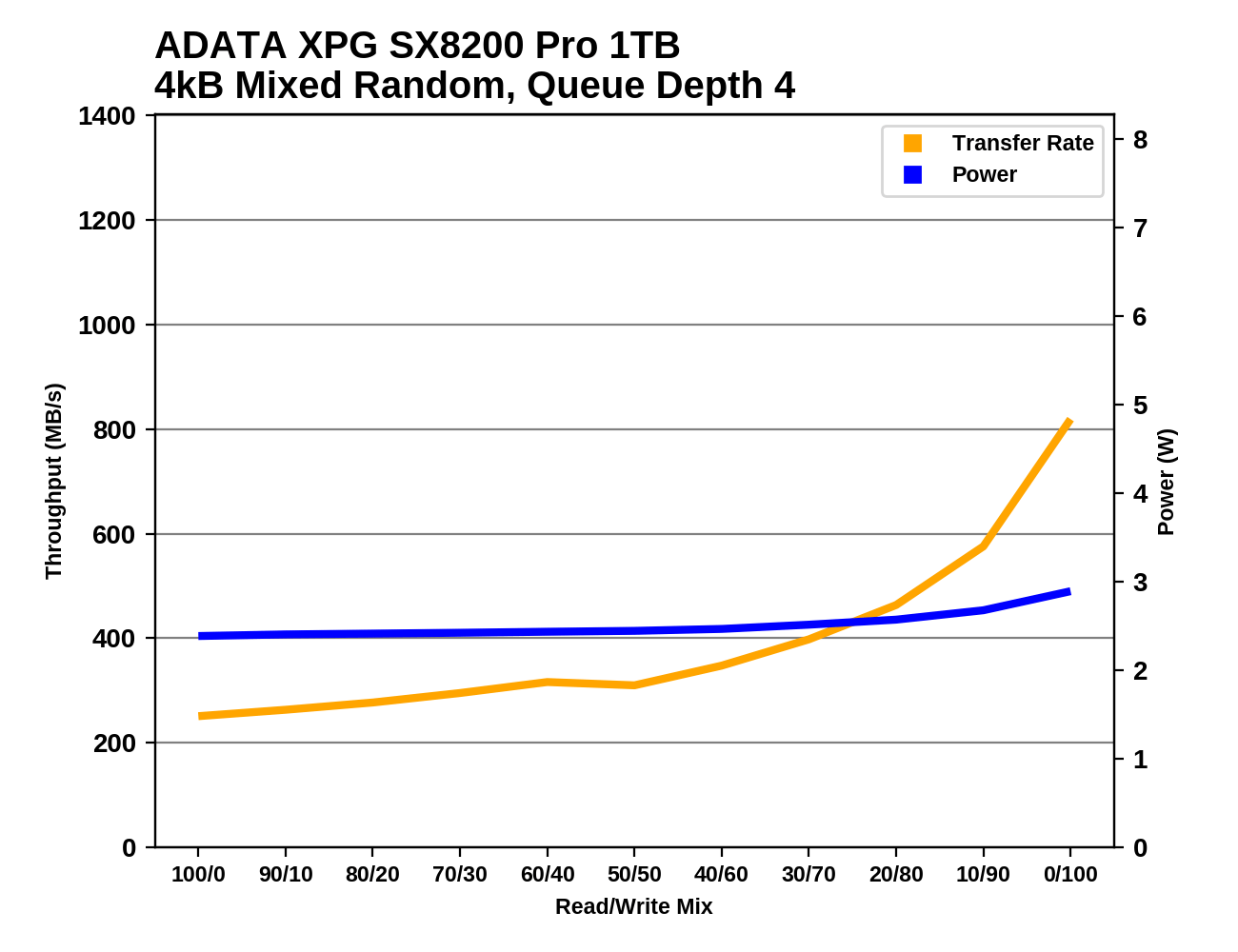 |
|||||||||
Compared to their predecessors and most of the competition, the SX8200 Pro and EX950 offer better performance during the read-heavy half of the test. The 970 EVO Plus pulls ahead during the write-heavy half of the test, which is generally faster anyways since write operations can be cached and combined. The Toshiba XG6 and WD Black SN750 that are more efficient than the SX8200 Pro are slower during every phase of the test except for the final segment with pure writes.
Mixed Sequential Performance
Our test of mixed sequential reads and writes differs from the mixed random I/O test by performing 128kB sequential accesses rather than 4kB accesses at random locations, and the sequential test is conducted at queue depth 1. The range of mixes tested is the same, and the timing and limits on data transfers are also the same as above.
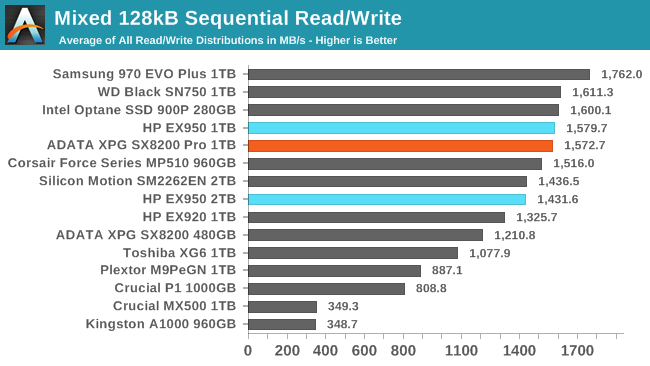
The SM2262EN drives provide great performance on the mixed sequential I/O test, but the Samsung 970 EVO Plus maintains a clear lead, and the 2TB HP EX950 is back to being slower than the 1TB models.
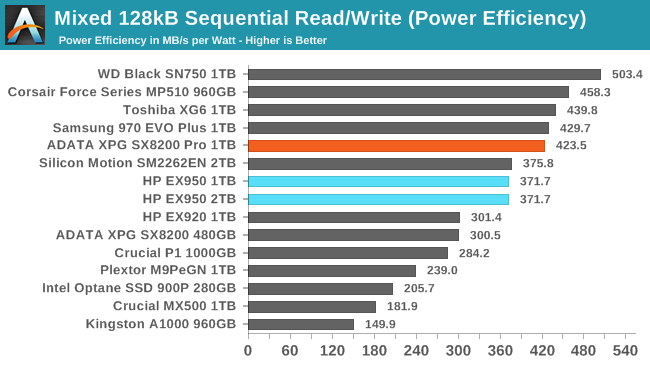 |
|||||||||
| Power Efficiency in MB/s/W | Average Power in W | ||||||||
The 1TB ADATA SX8200 Pro just barely provides top-tier power efficiency on the mixed sequential I/O test, but the handful of drives that score better include most of the important competition: the latest from Samsung, WD, Toshiba and Phison.
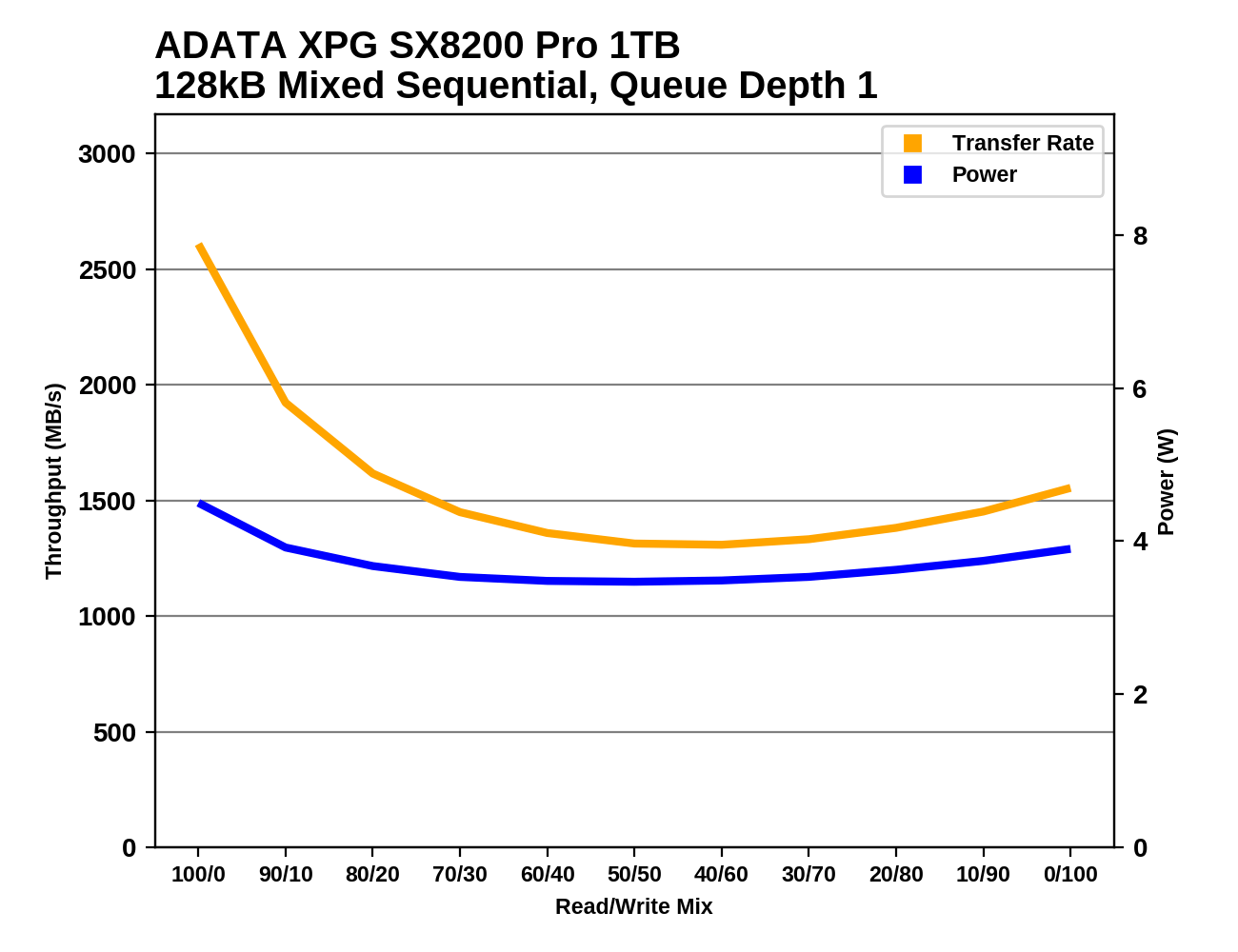 |
|||||||||
The 2TB HP EX950 is slower than the 1TB model throughout the test, except for the pure read and write segments at either end. The 1TB SX8200 Pro and EX950 outperform their predecessors by an increasingly large margin as the workload becomes more write-heavy. The Samsung 970 EVO Plus that turns in the fastest overall performance runs up the score during the read-heavy half of the test but is no faster than the SM2262EN drives during the write-heavy half.










42 Comments
View All Comments
wolfesteinabhi - Wednesday, February 6, 2019 - link
this is a bit of worrying trend where we are getting same products with new/updated firmware...the firmware that was essentially free earlier...and get improved performance...now they have to pay and buy new hardware for it.ERJ - Wednesday, February 6, 2019 - link
When is the last time you updated the firmware on your hard drive? RAID card / BIOS / Video Card sure, but hard drive?Now, you could argue that the controller is essentially part of the hard drive in this case but still.
jeremyshaw - Wednesday, February 6, 2019 - link
Hard drive? They aren't that old, right? You do remember HDD firmware updates. As for SSDs, I've recently updated the firmware on my SSDs. Heck, even my monitor has been through a firmware update. Like the SSD updates, the monitor firmware affected performance and compatibility.jabber - Thursday, February 7, 2019 - link
I used to worry about SSD firmware updates when I was getting in 1 every blue moon and it had novelty value but 200+ SSDs later I now just don't bother. At the end of the day getting an extra 30MBps just isnt the boost it was all those years ago.ridic987 - Wednesday, February 6, 2019 - link
We are discussing SSD's not hard drive. Literally the thing what he is saying most applies to.Samus - Thursday, February 7, 2019 - link
I agree, the lack of SSD firmware updates - particularly what WD has pulled with the Black SSD's - is troubling. To artificially limit product improvement through restricting software updates and requiring the user to purchase an entirely new product sets a bad precedent. They could at least do what HP does in the server market and charge for support beyond the warranty. After a server warranty is up (typically 3 years) you have to pay for firmware and BIOS updates for servers. This isn't a terrible policy, at least it wasn't until meltdown\spectre hit and all the sudden it seemed somewhat necessary to update server firmware that were many years old.Hard drives get firmware updates all the time - just not from the manufacturers. They typically applicable to retail products for reasons. But go ahead and look up a random OEM PC's drivers from Dell or HP and you might see various firmware updates available for the hard disk models those PC's shipped with.
Are they important though? Rarely. Barring any significant bug, hard disks have little to benefit from firmware updates as they are so mechanically limited and the controllers are generally quite mature, having been based on incremental generations of past firmware. This could all change as MAMR and HAMR become more mainstream, the same way the only hard disk firmware I remember being common were the WD Black2 (the SSD+HDD hybrid) and various Seagate SSHD's - for obvious reasons. The technology was new, and there are benefits to updating the SSD firmware as improvements are made through testing and customer feedback.
melgross - Thursday, February 7, 2019 - link
I think of it the other way around. Unless there’s a serious bug in the firmware, firmware upgrades are a gift, that manufacturers don’t have to give.The fact is that even when they are available, almost no one applies them. That’s true even for most who know they’re available. It’s alwasys dangerous to upgrade firmware on a product so central to needs. If there’s an unfounded bug in the new upgrade, that could be worse than firmware that’s already working just fine, but isn’t quite as fast as you might wish foe.
I’ve never seen any major upgrade in performance from a drive firmware upgrade. Ever.
FullmetalTitan - Thursday, February 7, 2019 - link
Those of us around for sandforce controllers remember well the pains of updating SSD firmware to make our drives useableDigitalFreak - Wednesday, February 6, 2019 - link
Billy - how far are we away from having 4TB M.2 NVMe drives?Billy Tallis - Wednesday, February 6, 2019 - link
Most SSD vendors could produce 4TB double-sided M.2 drives using off the shelf parts. Putting 4TB on a single-sided module would require either going with a DRAMless controller, stacking DRAM and the controller on the same package, or using 1Tb+ QLC dies instead of TLC.So currently any 4TB M.2 drive would have at least some significant downside that either compromises performance, restricts compatibility, or drives the price up well beyond twice that of a 2TB M.2 drive. There's simply not enough demand for such drives, and likely won't be anytime soon.